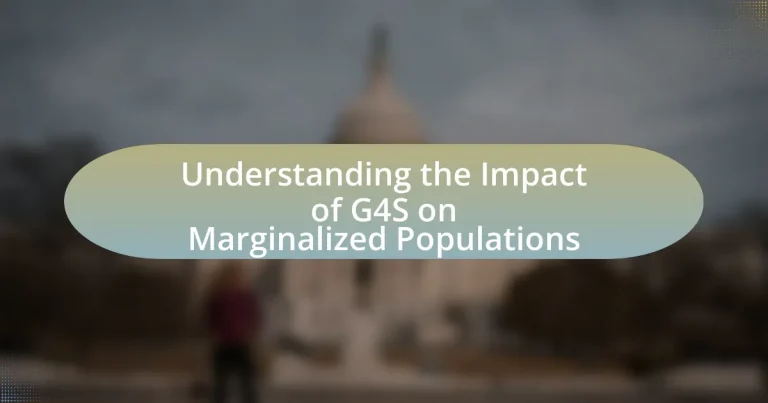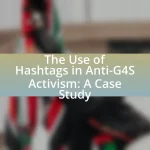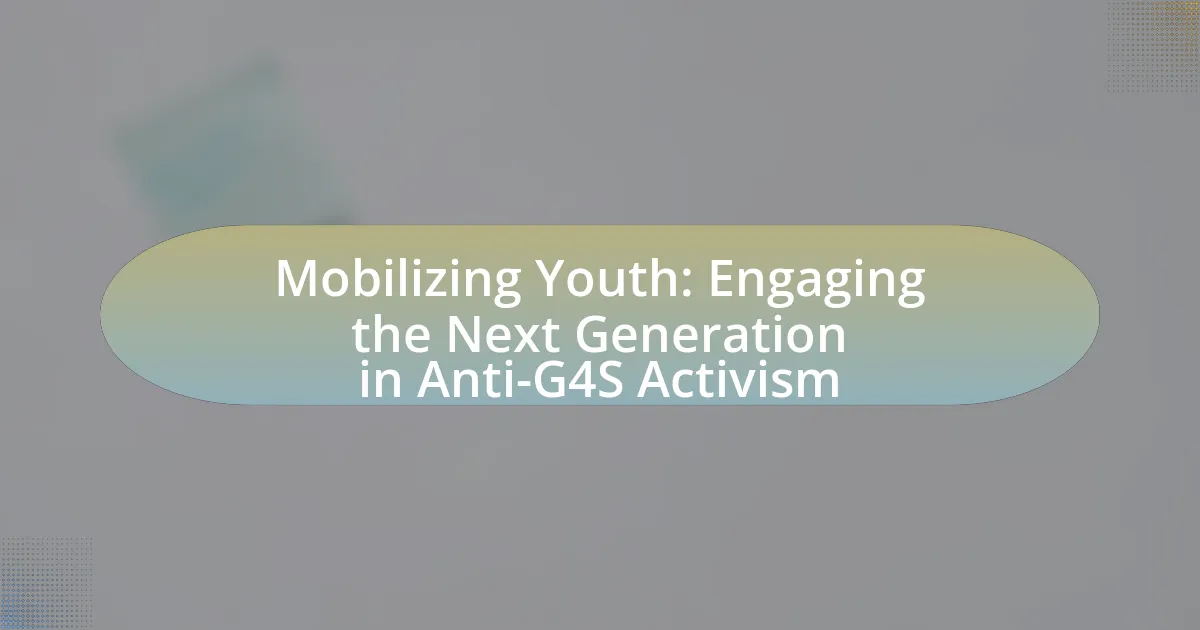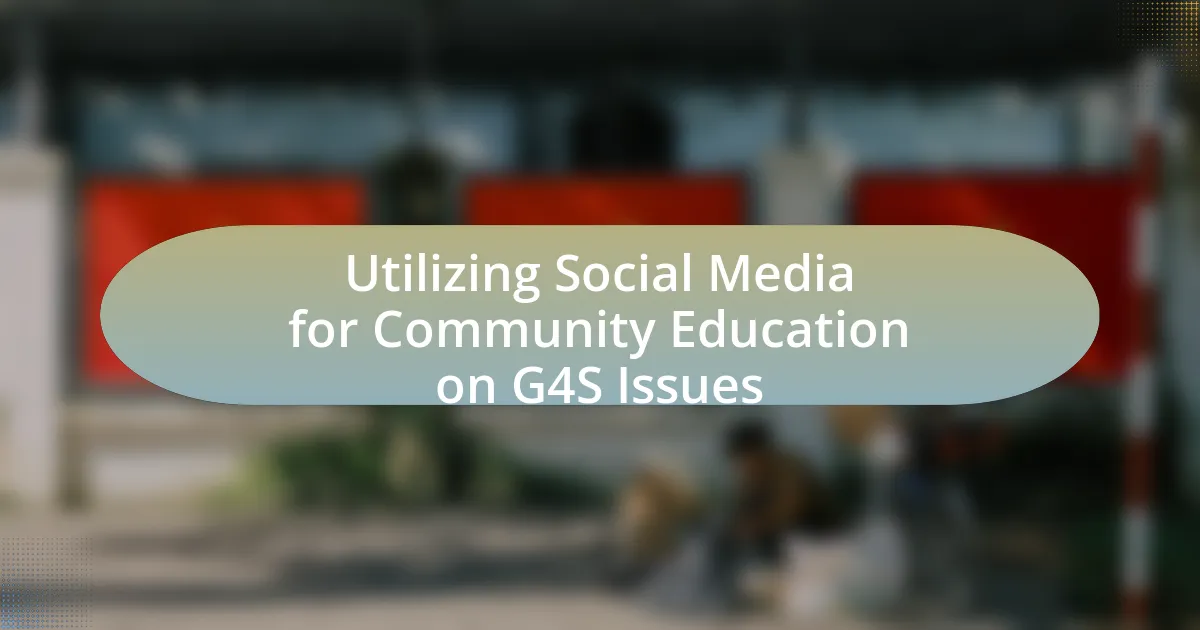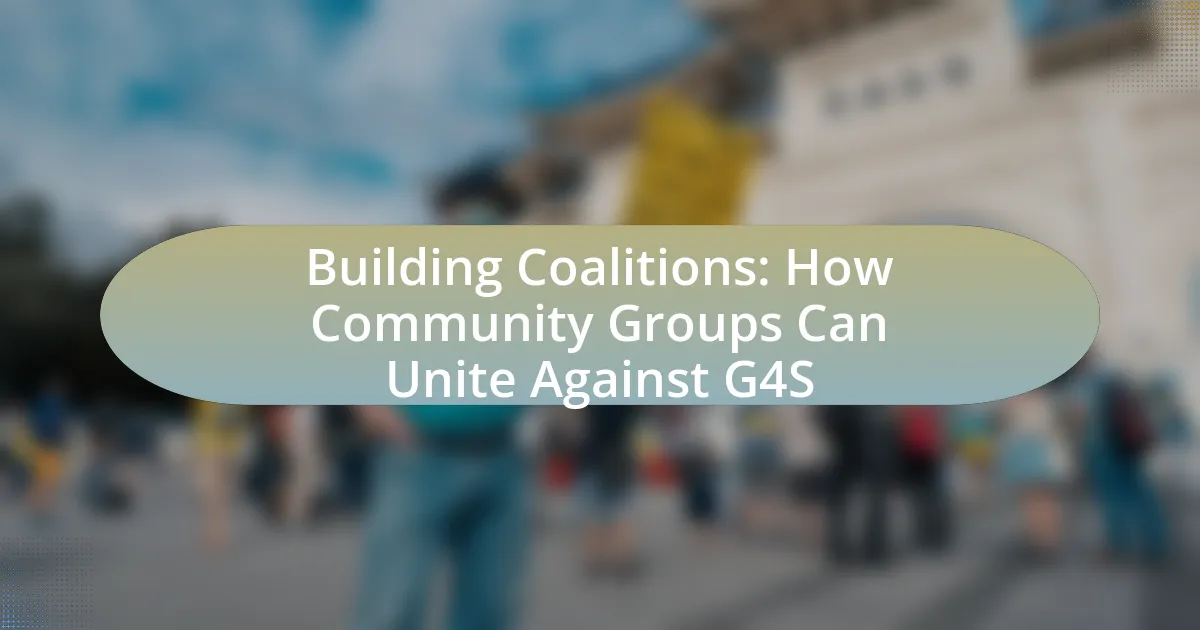G4S, a global security services provider, significantly impacts marginalized populations, often exacerbating their vulnerabilities through controversial practices such as privatization and increased surveillance. The article examines G4S’s operations within these communities, highlighting both the security services it provides and the economic opportunities it creates, while also addressing the challenges faced by marginalized groups, including discrimination and inadequate access to services. Furthermore, it discusses the criticisms G4S faces regarding human rights violations and the ethical implications of its practices, as well as potential solutions for improving its impact through community engagement and collaboration with local organizations. The article emphasizes the need for regulatory oversight and equitable treatment to ensure that G4S’s presence positively influences marginalized populations.
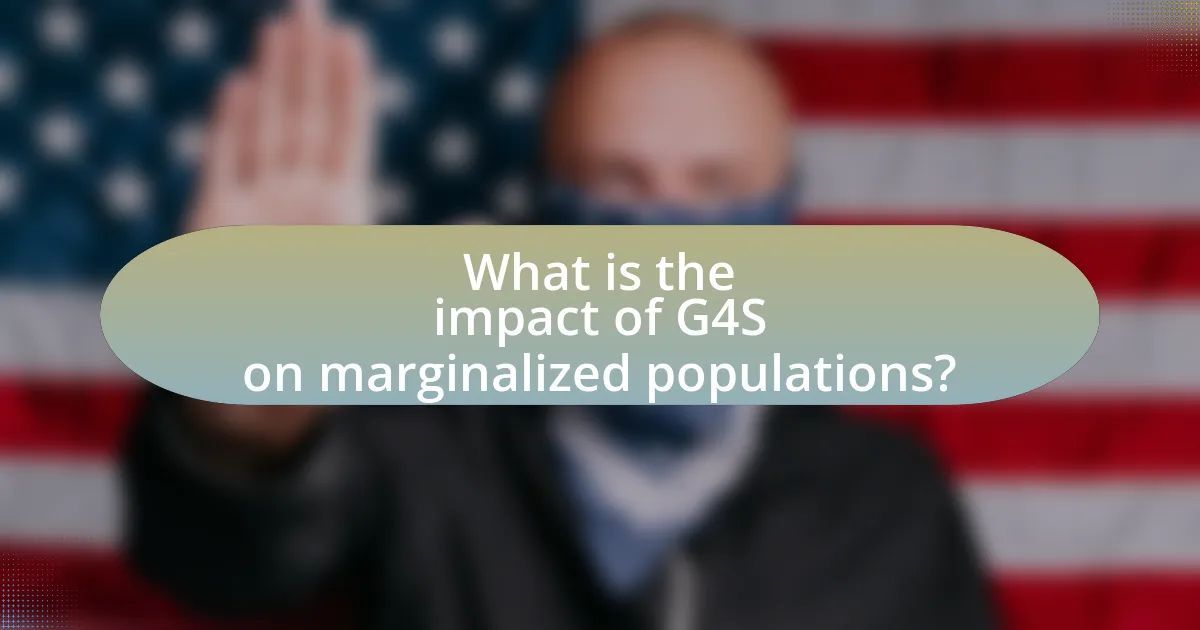
What is the impact of G4S on marginalized populations?
G4S has a significant impact on marginalized populations, often exacerbating their vulnerabilities. The company, which provides security services globally, has been involved in controversial practices such as the privatization of public services, which can lead to increased surveillance and policing in low-income communities. For instance, in the UK, G4S has faced criticism for its role in the detention of asylum seekers, where reports indicate that marginalized groups experience heightened levels of stress and trauma due to their treatment. Additionally, G4S’s involvement in security contracts in various countries has raised concerns about human rights violations, particularly affecting marginalized ethnic and social groups. These practices contribute to systemic inequalities, reinforcing barriers that marginalized populations face in accessing justice and social services.
How does G4S operate within communities of marginalized populations?
G4S operates within communities of marginalized populations by providing security services that aim to enhance safety and stability. The company engages in partnerships with local organizations to address specific security needs, often focusing on areas with high crime rates or social unrest. For instance, G4S has implemented community policing initiatives in various regions, which involve collaboration with local law enforcement and community leaders to foster trust and improve public safety. This approach is supported by evidence showing that community-oriented security measures can lead to reduced crime rates and increased community engagement.
What services does G4S provide that affect these communities?
G4S provides security services, cash solutions, and facility management that significantly impact marginalized communities. The security services include manned guarding, mobile patrols, and event security, which enhance safety and reduce crime rates in vulnerable areas. Cash solutions involve secure transportation and cash management, which support local businesses and improve economic stability. Facility management services ensure that public spaces are maintained, contributing to community well-being. These services collectively foster a safer environment and promote economic growth, thereby positively affecting marginalized populations.
How does G4S’s presence influence local economies?
G4S’s presence positively influences local economies by creating job opportunities and stimulating local businesses. The company employs thousands of individuals in various roles, contributing to reduced unemployment rates in the areas where it operates. For instance, G4S has reported employing over 500,000 people globally, which directly impacts local income levels and economic activity. Additionally, G4S contracts with local suppliers for services and goods, further enhancing the economic ecosystem. This engagement fosters a multiplier effect, where increased spending by G4S employees and local businesses leads to broader economic growth within the community.
What are the key challenges faced by marginalized populations in relation to G4S?
Marginalized populations face significant challenges in relation to G4S, primarily including issues of discrimination, inadequate access to services, and heightened surveillance. Discrimination manifests in biased treatment during security operations, which can exacerbate existing social inequalities. Inadequate access to services occurs when G4S’s security measures limit the mobility and safety of marginalized groups, hindering their ability to access essential resources. Heightened surveillance often leads to increased scrutiny and profiling of these populations, contributing to a cycle of mistrust and fear. These challenges are documented in various studies highlighting the negative impact of privatized security on vulnerable communities.
How does G4S’s security approach affect community safety?
G4S’s security approach enhances community safety by implementing comprehensive risk assessments and tailored security solutions that address specific local needs. This proactive strategy includes collaboration with local law enforcement and community organizations, which fosters trust and improves response times to incidents. For instance, G4S has been involved in community engagement initiatives that educate residents on safety practices, leading to a reported decrease in crime rates in areas where they operate. Additionally, their use of technology, such as surveillance systems and data analytics, allows for real-time monitoring and quicker identification of potential threats, further contributing to a safer community environment.
What criticisms have been raised against G4S regarding its treatment of marginalized groups?
G4S has faced significant criticisms regarding its treatment of marginalized groups, particularly concerning allegations of human rights abuses and discriminatory practices. Reports indicate that G4S has been involved in the mistreatment of detainees in immigration facilities, where instances of excessive force and inadequate medical care have been documented. Additionally, the company has been criticized for its role in the privatization of public services, which disproportionately affects low-income and minority communities. Human Rights Watch and other organizations have highlighted these issues, emphasizing that G4S’s operations often exacerbate systemic inequalities faced by marginalized populations.
How does G4S’s role intersect with social justice issues?
G4S’s role intersects with social justice issues primarily through its involvement in the privatization of security and incarceration services, which can exacerbate systemic inequalities. The company has been criticized for its contracts with governments and institutions that disproportionately affect marginalized communities, such as its role in immigration detention centers and prison management. For instance, G4S has faced scrutiny for its operations in the UK, where it has been linked to human rights violations and the mistreatment of detainees, highlighting the ethical implications of profit-driven security services on vulnerable populations. This intersection raises concerns about accountability, transparency, and the prioritization of profit over the welfare of individuals in marginalized groups.
What are the implications of G4S’s practices on human rights?
G4S’s practices have significant implications on human rights, particularly concerning the treatment of marginalized populations. The company’s involvement in security services, including immigration detention and prison management, has raised concerns about human rights violations, such as excessive use of force, inadequate living conditions, and lack of access to legal representation. Reports from organizations like Amnesty International and Human Rights Watch highlight instances where G4S personnel have been implicated in abusive practices, leading to calls for accountability and reform. These practices not only undermine the dignity of individuals but also contribute to systemic discrimination against vulnerable groups, exacerbating social inequalities.
How does G4S’s involvement in policing affect marginalized communities?
G4S’s involvement in policing often exacerbates the challenges faced by marginalized communities. This occurs due to practices such as increased surveillance and aggressive policing tactics, which disproportionately target these populations. For instance, studies have shown that private security firms like G4S can contribute to a heightened police presence in low-income neighborhoods, leading to a rise in arrests and community tensions. Additionally, reports indicate that marginalized groups experience a lack of accountability and transparency from private security forces, which can result in human rights violations. These factors collectively illustrate how G4S’s role in policing can negatively impact the safety and well-being of marginalized communities.
What are the legal and ethical considerations surrounding G4S’s operations?
G4S’s operations are subject to various legal and ethical considerations, primarily concerning human rights, labor practices, and compliance with local and international laws. Legally, G4S must adhere to regulations governing security services, which include licensing, training, and operational standards in the jurisdictions where it operates. Ethically, the company faces scrutiny over its treatment of employees, particularly regarding fair wages, working conditions, and the use of force in security operations. For instance, reports have highlighted instances of human rights violations in G4S’s detention center operations, raising concerns about the ethical implications of its involvement in immigration enforcement. These factors underscore the importance of accountability and transparency in G4S’s practices to ensure they align with both legal standards and ethical expectations.
How do community perceptions of G4S vary among marginalized populations?
Community perceptions of G4S among marginalized populations often reflect distrust and negative sentiment. This perception stems from experiences of over-policing, racial profiling, and a lack of accountability in security practices, which marginalized groups frequently report. For instance, studies indicate that communities of color view G4S as a symbol of systemic oppression, exacerbating feelings of vulnerability rather than safety. Additionally, reports from organizations like the American Civil Liberties Union highlight instances where G4S’s presence has led to increased tensions and fear within these communities, reinforcing the notion that their security measures are not designed to protect but to control.
What factors influence the trust or distrust of G4S in these communities?
The trust or distrust of G4S in communities is influenced by factors such as past interactions, community perceptions of security effectiveness, and transparency in operations. Historical incidents involving G4S, such as allegations of misconduct or inadequate responses to security issues, can lead to skepticism among community members. Additionally, if G4S is perceived as effective in enhancing safety and addressing local concerns, trust may increase. Transparency regarding policies, practices, and community engagement initiatives also plays a crucial role; communities are more likely to trust G4S if they feel informed and involved in security decisions.
How do cultural differences impact the relationship between G4S and marginalized groups?
Cultural differences significantly impact the relationship between G4S and marginalized groups by influencing perceptions, trust, and communication. For instance, G4S, as a global security company, operates in diverse cultural contexts where marginalized groups may have historical grievances or mistrust towards security forces due to past experiences of discrimination or violence. This mistrust can lead to resistance against G4S’s initiatives, as seen in various reports highlighting community pushback in areas where security measures are perceived as oppressive rather than protective. Additionally, cultural norms and values shape how marginalized groups interpret G4S’s presence and actions, potentially leading to misunderstandings and conflict. For example, in communities where collective decision-making is valued, G4S’s top-down approach may be viewed as disrespectful, further straining relationships.
What are the potential solutions to improve G4S’s impact on marginalized populations?
To improve G4S’s impact on marginalized populations, the company can implement community engagement programs that prioritize collaboration with local organizations. These programs can facilitate dialogue and understanding between G4S and marginalized communities, ensuring that security measures are culturally sensitive and address specific community needs. Additionally, G4S can invest in training programs for its staff focused on diversity and inclusion, which would enhance their ability to interact respectfully and effectively with diverse populations. Research indicates that companies that actively engage with the communities they serve tend to foster trust and improve their overall impact, as seen in case studies of organizations that have successfully integrated community feedback into their operational strategies.
How can G4S enhance its community engagement strategies?
G4S can enhance its community engagement strategies by implementing targeted outreach programs that address the specific needs of marginalized populations. By conducting thorough community assessments, G4S can identify key issues such as safety concerns, employment opportunities, and access to services that affect these groups. Evidence from successful community engagement initiatives, such as the “Community Safety Partnerships” model, demonstrates that tailored programs can significantly improve trust and collaboration between security providers and local communities. Additionally, G4S can leverage partnerships with local organizations to facilitate workshops and training sessions, fostering a sense of ownership and empowerment among community members.
What best practices can G4S adopt to foster positive relationships with marginalized populations?
G4S can foster positive relationships with marginalized populations by implementing community engagement initiatives that prioritize dialogue and collaboration. These initiatives should include regular outreach programs that involve local leaders and community members in decision-making processes, ensuring their voices are heard and respected. For instance, G4S can establish partnerships with local organizations that advocate for marginalized groups, facilitating workshops and training sessions that address community-specific concerns. Evidence from successful community policing models indicates that such collaborative approaches enhance trust and reduce tensions between security providers and local populations, ultimately leading to safer environments for all stakeholders involved.
How can G4S address the criticisms it faces from these communities?
G4S can address the criticisms it faces from marginalized communities by implementing community engagement initiatives that foster dialogue and collaboration. By actively involving community members in decision-making processes and addressing their concerns, G4S can build trust and improve its public image. For instance, G4S has previously engaged in partnerships with local organizations to enhance transparency and accountability in its operations, demonstrating a commitment to addressing community needs. This approach not only mitigates criticism but also aligns with best practices in corporate social responsibility, as evidenced by successful case studies in similar sectors.
What role can policymakers play in regulating G4S’s impact?
Policymakers can establish regulations that ensure G4S operates within ethical and legal frameworks, thereby mitigating its impact on marginalized populations. By implementing oversight mechanisms, such as audits and compliance checks, policymakers can hold G4S accountable for its practices, particularly in areas like security services and detention facilities. For instance, legislation can be enacted to enforce standards that protect the rights of individuals in custody, as seen in various human rights frameworks. Additionally, policymakers can promote transparency by requiring G4S to disclose operational data, which can help identify and address any discriminatory practices. This regulatory approach is essential for safeguarding the interests of vulnerable communities affected by G4S’s operations.
What policies could be implemented to protect marginalized populations from negative impacts of G4S?
Implementing community engagement policies can protect marginalized populations from the negative impacts of G4S. These policies should include establishing advisory boards composed of community representatives to ensure that the voices of marginalized groups are heard in decision-making processes. Additionally, transparency measures, such as public reporting on G4S operations and their effects on local communities, can hold the company accountable. Evidence from various studies indicates that community involvement leads to better outcomes in social justice and equity, as seen in initiatives where local feedback has resulted in improved service delivery and reduced harm to vulnerable populations.
How can collaboration between G4S and community organizations improve outcomes?
Collaboration between G4S and community organizations can improve outcomes by enhancing security measures and fostering trust within marginalized populations. When G4S partners with local organizations, it can leverage their insights and resources to address specific community needs, leading to tailored security solutions that are more effective. For instance, studies have shown that community engagement in security initiatives can reduce crime rates by up to 30%, as seen in various urban areas where collaborative programs were implemented. This partnership not only increases the effectiveness of security operations but also builds a positive relationship between G4S and the community, ultimately leading to safer environments and improved quality of life for marginalized groups.
What are the best practices for ensuring equitable treatment of marginalized populations by G4S?
G4S can ensure equitable treatment of marginalized populations by implementing comprehensive training programs focused on diversity, equity, and inclusion. These programs should educate employees on the specific needs and rights of marginalized groups, fostering an understanding of cultural sensitivities and biases. Additionally, G4S should establish clear policies that promote accountability and transparency in interactions with these populations, ensuring that any incidents of discrimination are addressed promptly and effectively. Regular assessments of service delivery and community feedback mechanisms can further enhance equitable practices, allowing G4S to adapt its strategies based on the experiences and needs of marginalized communities.
